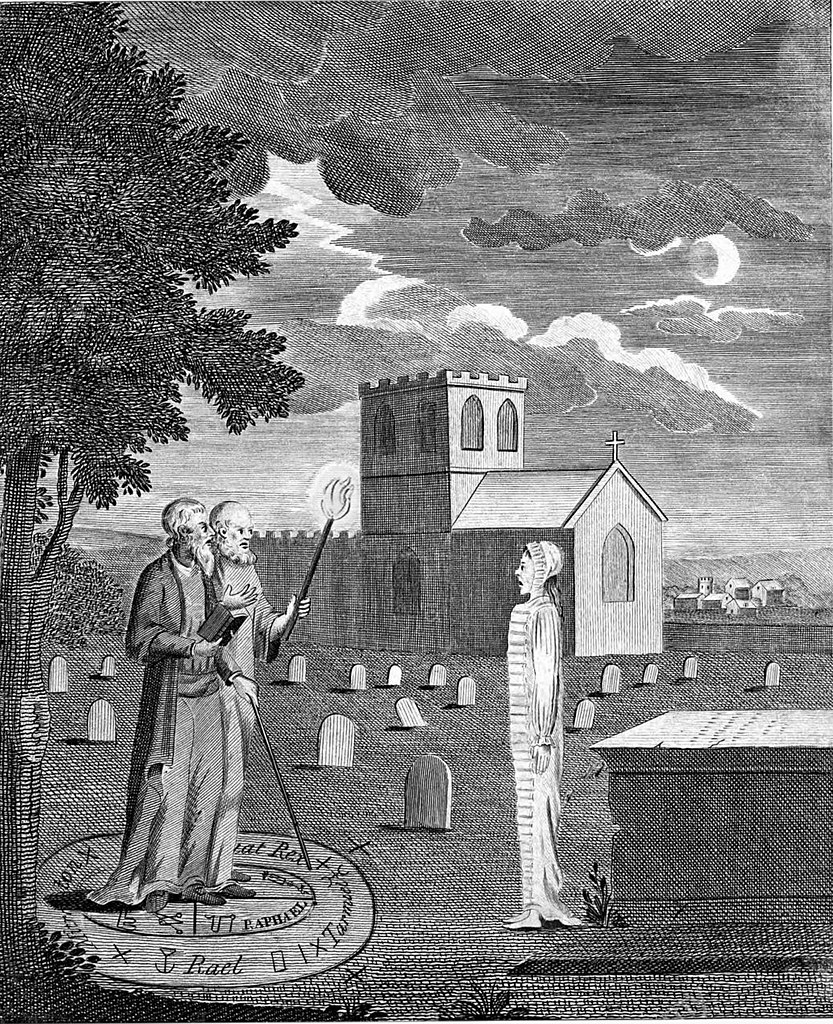Difference between revisions of "Template:Occult.live:Today's featured article"
Occultwiki (talk | contribs) |
Occultwiki (talk | contribs) |
||
| Line 1: | Line 1: | ||
[[File:John-Dee-Evoking.jpg|250px|left]] | [[File:John-Dee-Evoking.jpg|250px|left]] | ||
'''[[Necromancy]]''' is the practice of [[ritual magic|magic]] or [[black magic]] involving communication with the dead – either by summoning their spirits as apparitions, visions or raising them bodily – for the purpose of [[divination]], imparting the means to [[Clairvoyance|foretell future events]], discover hidden knowledge, to bring someone back from the dead, or to use the dead as a weapon | '''[[Necromancy]]''' is the practice of [[ritual magic|magic]] or [[black magic]] involving communication with the dead – either by summoning their spirits as apparitions, visions or raising them bodily – for the purpose of [[divination]], imparting the means to [[Clairvoyance|foretell future events]], discover hidden knowledge, to bring someone back from the dead, or to use the dead as a weapon. | ||
Early necromancy was related to – and most likely evolved from – [[shaman]]ism, which calls upon spirits such as the ghosts of ancestors. Classical necromancers addressed the dead in "a mixture of high-pitch squeaking and low droning," comparable to the trance-state mutterings of shamans. Necromancy was prevalent throughout antiquity with records of its practice in ancient Egypt, Babylonia, Greece and Rome. Though [[Judaism|Jewish]] Law prescribed the death penalty to practitioners of necromancy (Leviticus 20:27), this warning was not always heeded. One of the foremost examples is when King Saul had the [[Witch of Endor]] invoke the spirit of Samuel, a judge and [[prophet]], from Sheol using a ritual conjuring pit (1 Samuel 28:3–25). | |||
'''([[Necromancy|Full Article...]])''' | '''([[Necromancy|Full Article...]])''' | ||
Revision as of 15:46, 19 October 2023
Necromancy is the practice of magic or black magic involving communication with the dead – either by summoning their spirits as apparitions, visions or raising them bodily – for the purpose of divination, imparting the means to foretell future events, discover hidden knowledge, to bring someone back from the dead, or to use the dead as a weapon.
Early necromancy was related to – and most likely evolved from – shamanism, which calls upon spirits such as the ghosts of ancestors. Classical necromancers addressed the dead in "a mixture of high-pitch squeaking and low droning," comparable to the trance-state mutterings of shamans. Necromancy was prevalent throughout antiquity with records of its practice in ancient Egypt, Babylonia, Greece and Rome. Though Jewish Law prescribed the death penalty to practitioners of necromancy (Leviticus 20:27), this warning was not always heeded. One of the foremost examples is when King Saul had the Witch of Endor invoke the spirit of Samuel, a judge and prophet, from Sheol using a ritual conjuring pit (1 Samuel 28:3–25).
